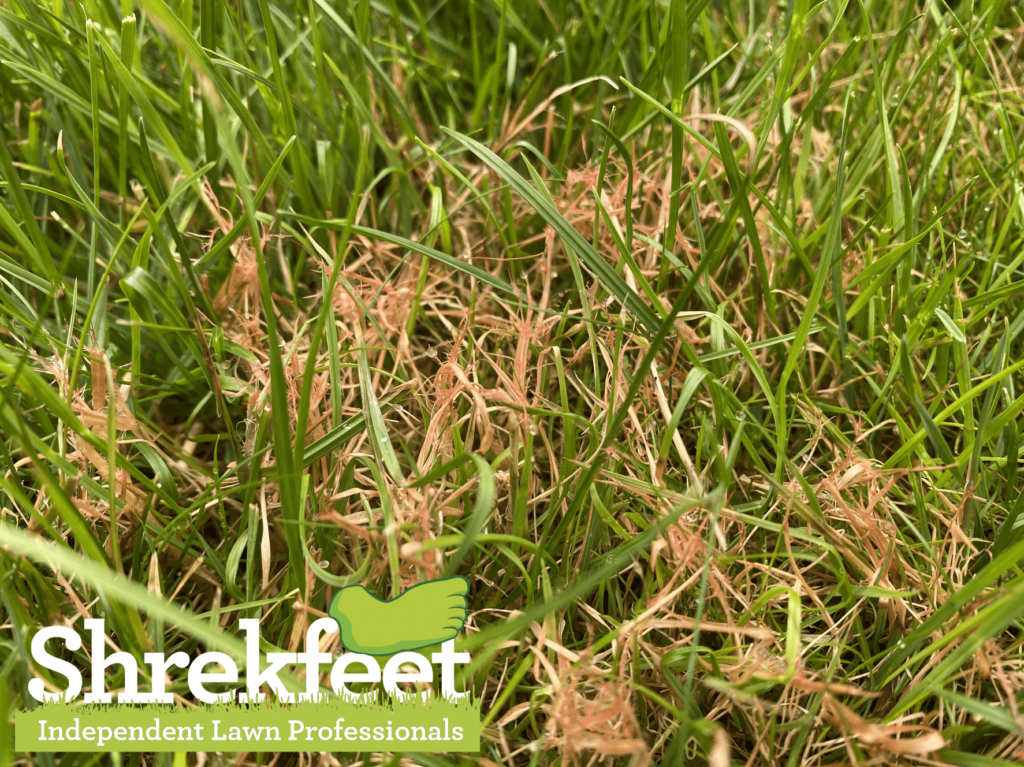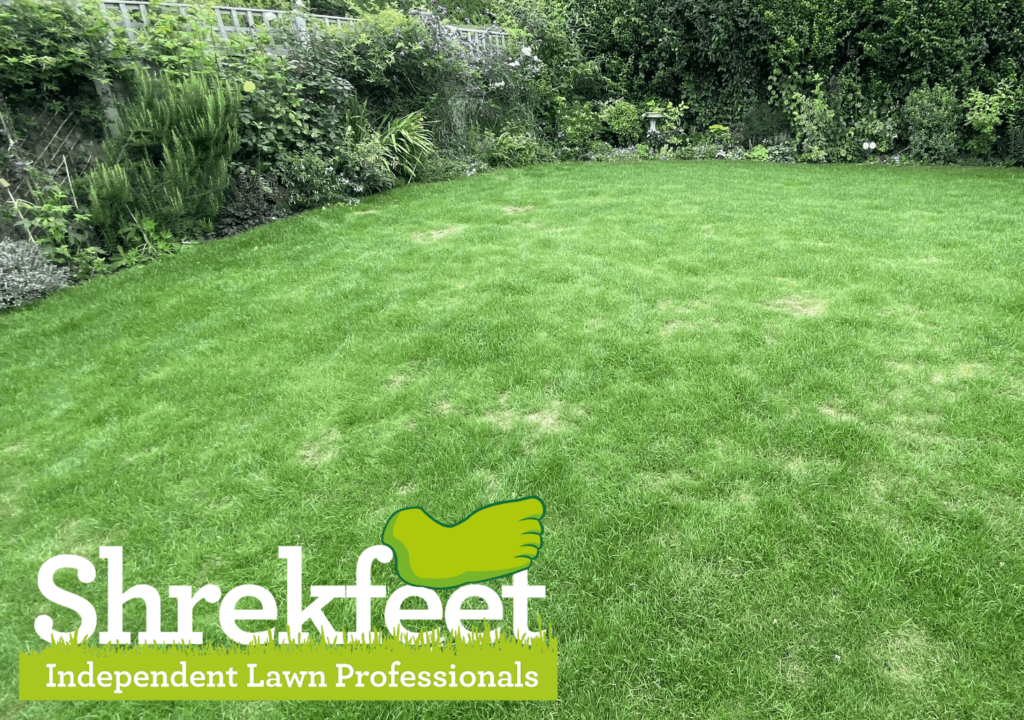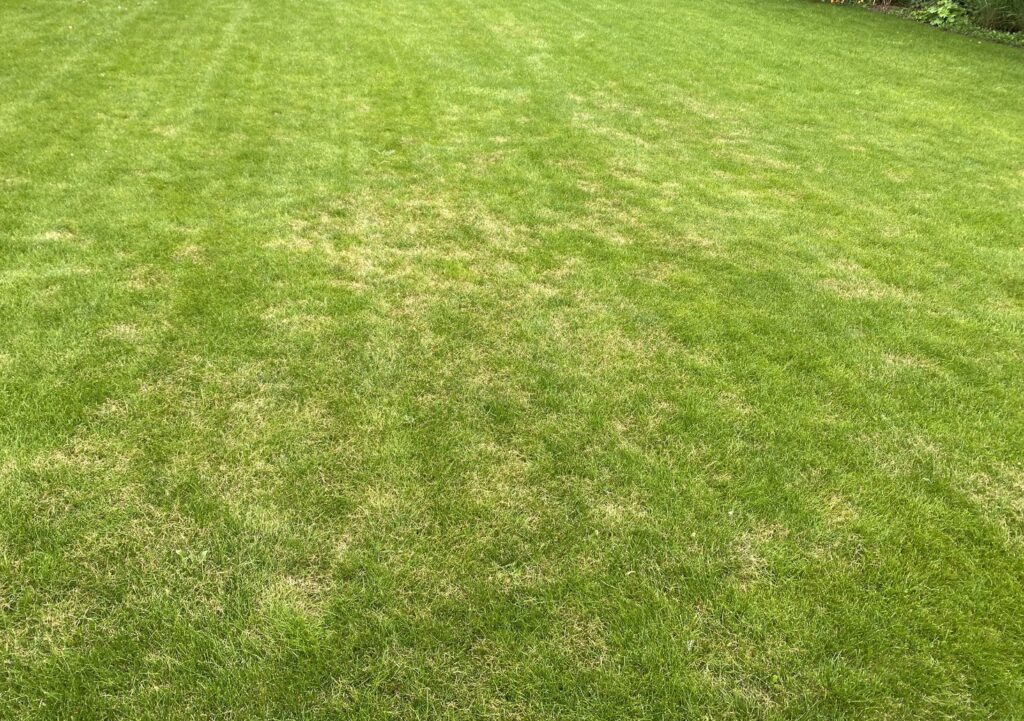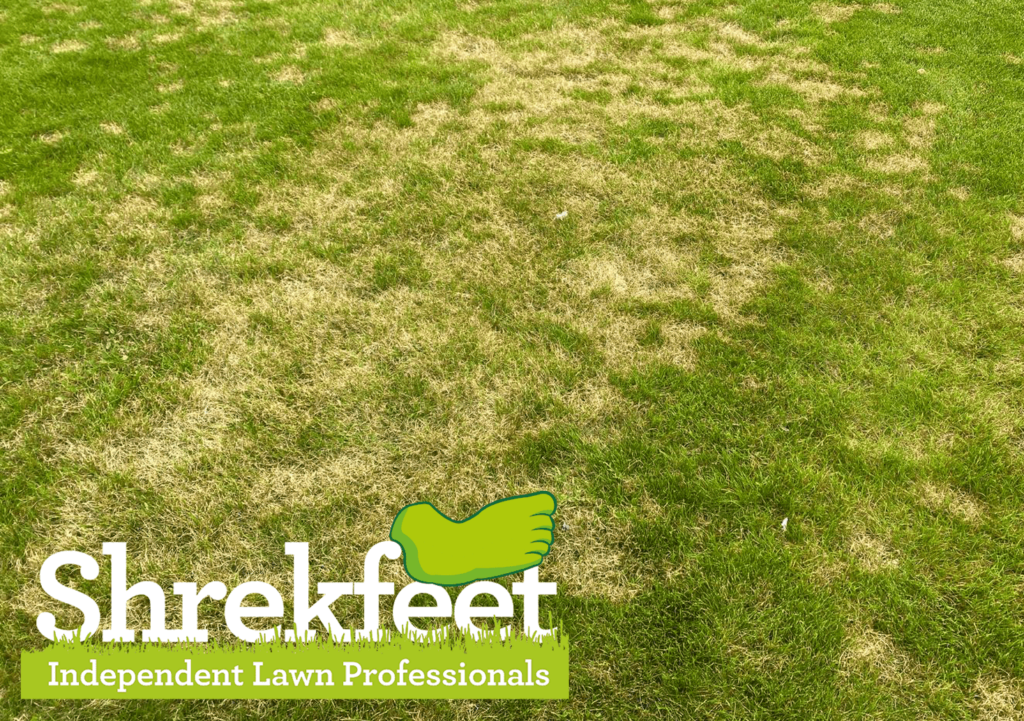What It Is, How to Prevent It, and Why You Need a Lawn Care Expert
If you’ve noticed patches of reddish or brown grass in your lawn, you could be dealing with red thread, one of the most common lawn diseases in the UK. Red thread is a fungal disease that thrives in the UK’s damp, cool climate, particularly in lawns that are low in nutrients.
It’s a major concern for homeowners who want to maintain a lush, healthy lawn. While some DIY solutions can help, it can be very easy to get wrong and damage grass – trust us, we’ve seen this happen! Professional lawncare from a lawn care expert can help keep your lawn in top condition year-round.

Closeup photo of Red Thread in a customer’s lawn
What is Red Thread?
Red thread lawn disease, caused by the fungus Laetisaria fuciformis, targets grass blades, leaving unsightly reddish or pinkish strands on the surface of your lawn. It’s especially common during periods of high humidity, typically from late spring to early autumn, when the UK experiences cooler, wetter weather.
Although red thread does not kill the grass roots, it weakens the lawn’s overall health, causes ugly scarring and leaves your lawn more vulnerable to other diseases and pests. That’s why it’s crucial to identify and treat the problem early with the help of a professional lawn care service.
Causes of Red Thread in Lawns
Several factors contribute to the development of red thread, and understanding these can help you prevent its spread:
- Nutrient Deficiency: Lawns that are low in nitrogen are more prone to red thread. This deficiency causes weak growth, making your lawn more susceptible to fungal infections.
- Excessive Moisture: The UK’s damp climate provides perfect conditions for the spread of red thread. Over-watering or poor drainage can worsen the problem.
- Heavy Thatch: Excessive levels of thatch can exacerbate the spread of red thread. Fungal spores are protected in the moist, humid lawn environment caused by excessive thatch levels, allowing the disease to begin again, even after the initial attack has elapsed.
- Cool Temperatures: Red thread thrives in cooler temperatures, typically between 10°C and 20°C, making UK lawns particularly vulnerable during the spring and autumn months.
- Mowing Tolerance: Not all UK grass varieties can tolerate being mown short. Mowing too short in extreme weather conditions can weaken grass.
- Dull Mower Blades: Likewise, mower blades that are not sharp can tear grass, rather than cut it. This leaves an open wound, which the grass then has to heal, taking longer to recover. During this period, grass is susceptible to disease.
- Low-level damage caused by Red Thread
- Medium-level damage caused by Red Thread
- High-level damage caused by Red Thread
How to Identify Red Thread in Your Lawn
The first step in tackling red thread is recognising its symptoms. The earlier you identify it, the easier it is to treat. Look for:
- Red or Pinkish Threads: Thin red or pink strands that appear on grass blades are a tell-tale sign.
- Patchy Discoloration: Affected areas often appear brown or straw-like, with irregular patches that can grow up to a metre wide.
- Slow Grass Growth: Infected grass may grow slower than healthy areas, making your lawn look uneven.
If you spot these signs, contact us immediately. We will perform a thorough assessment and recommend the best course of action to restore your lawn.
Why Hiring a Lawn Care Expert is Essential
While there are DIY methods to combat red thread, hiring a lawn care expert offers numerous advantages that can save you time, effort, and money in the long run.
- Accurate Diagnosis and Treatment: A lawn care professional can accurately diagnose red thread and recommend the most effective treatment, whether it’s applying the right fertiliser or performing a scarification to reduce thatch build-up and improve lawn health.
- Tailored Lawn Care Plans: Lawn care experts provide a comprehensive, personalised plan that targets red thread while promoting long-term lawn health. They take into account factors like soil composition, drainage, and your lawn’s specific nutrient needs to create a strategy that ensures your lawn stays lush and disease-free.
- Expertise in Fungicide Application: While fungicides can be effective against severe cases of red thread, improper use can damage your lawn or be harmful to the environment. A trained lawn care specialist knows the right products and application techniques to safely and effectively treat your lawn without the risks associated with DIY approaches.
- Prevention and Maintenance: Preventing red thread is easier than treating it once it spreads. A lawn care expert can implement proactive measures such as regular lawn aeration, professional fertilisation, and moss control to ensure your grass remains healthy and less prone to fungal diseases.
See our guide on how professional lawncare works: https://www.shrekfeet.com/blog/how-does-professional-lawncare-work
How a Lawn Care Expert Prevents Red Thread
Here’s why hiring a professional can make all the difference in keeping red thread at bay:
- Proper Fertilisation: Lawn care professionals will apply a nitrogen-rich fertiliser tailored to your lawn’s specific needs, ensuring that your grass grows strong and resistant to fungal infections like red thread.
- Aeration and Scarification: Compacted soil and thatch build-up create ideal conditions for red thread to thrive. Lawn experts will aerate and scarify your lawn, improving water drainage and allowing nutrients to reach the grass roots.
- Advice on Water Management: Over-watering or poorly timed watering can encourage red thread. Professionals know the right watering schedule and techniques to reduce moisture build-up, especially during humid UK weather.
- Ongoing Monitoring: Lawn care experts will regularly monitor your lawn for signs of red thread and other issues, ensuring problems are caught early and addressed before they spread.
How to Treat Red Thread in Lawns
While red thread can be a persistent problem, effective treatment options are available. Here’s how a lawn care expert can help:
- Nutritional Lawn Treatment Plan: Nitrogen deficiency is a leading cause of red thread, and the right fertiliser, care and guidance will provide the essential requirements to help your lawn recover.
- Improve Lawn Care Practices: The correct mowing regime and watering schedules are crucial to help prevent Red Thread – and any disease, for that matter. Regular aeration and scarification (where necessary) will further promote healthy grass growth and reduce the risk of disease.
- Over-seeding: Lawns that are predominantly fine fescue are most susceptible to red thread disease. Over-seeding your lawn with a premium, robust, stronger grass type will help to reduce the risk of red thread.
- Combative Treatment: Once red thread has been identified, we can offer our additional ‘Rejuvenate’ service, which is a treatment designed to increase grass resilience and combat active disease. This will provide the essential micronutrients, amino acids and nitrogen top-up that your grass needs to fight off the disease and recover.
- Preventative Fungicide: In severe longer term cases, we may advise a preventative fungicide to reduce the risk of red thread. This is often a last resort, as most cases can be managed through improved lawn care practices and a treatment plan.
The Importance of Year-Round Lawn Care
Consistent, year-round care is crucial to prevent not just red thread, but a variety of other lawn diseases that can damage your grass. By investing in a professional lawn care service, you ensure that your lawn gets the attention it needs, from tailored fertilisation plans to expert scarification and aeration. Not only will this help combat red thread, but it will also give you a lawn that looks its best throughout every season.
Conclusion
Red thread is a common problem for UK lawns, but with the right approach, it can be easily managed and prevented. While DIY methods can offer temporary relief, hiring a lawn care expert provides long-lasting solutions that keep your lawn healthy and vibrant year-round. From diagnosing red thread to developing a personalised care plan, lawn professionals offer the expertise needed to give you a lush, disease-free lawn. Don’t let red thread ruin your lawn—contact us today for the best results.
Find a local, independent lawncare expert in your area: https://www.uklawncare.net/specialist-search/

 Established 2016
Established 2016






